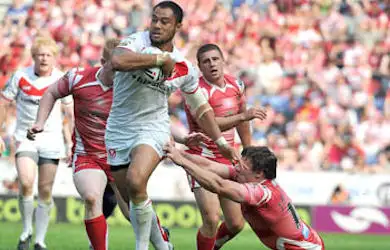The dangers of a shoulder charge to the head

The shoulder charge debate is back on the agenda after two controversial incidents in last weekend’s Super League and NRL games.
On Friday night in the south of France, Tony Puletua was sent off for crushing Gregory Mounis’ face while on Saturday morning (UK time) Greg Inglis’ shoulder charge on Dean Young saw the St George Illawarra back rower knocked out for several moments.
Watch the Tony Puletua shoulder charge on Gregory Mounis below.
Watch the Greg Inglis shoulder charge Dean Young below.
Since Friday night there appears to be a mixed reaction to Puletua’s hit on Mounis. Some argue against Ben Thaler’s decision to dismiss the St Helens prop from the field of play, while others are siding with the Yorkshire official in sending him from the field.
Puletua’s sending off is consistent with Richard Silverwood’s decision to dismiss Sam Moa for a very similar challenge on Julien Rinaldi earlier this season between Hull FC and London Broncos.
Watch Sam Moa’s shoulder charge on Julien Rinaldi below.
In all three instances there was direct contact with the ball carrier’s head. In all three instances the defender lined up the ball carrier, ruling out any circumstance of accidental contact. The defender knows what he is doing, and knows he is committing to a potentially dangerous move.
From this point on it is up to the defender to make sure there is no contact to the head. The shoulder charge, when it hits the chest, is a very effective tackling procedure which gets the crowd on it’s feet. I personally have no problem with the shoulder charge when it is executed and time perfectly to the body.
However if it makes contact with the head, like in all three circumstances above, it is dangerous. If anybody thinks otherwise I would love for them to be on the receiving end of Inglis’ shoulder. That might change their mind, if they wake up afterwards.
While rugby league is seen as entertainment for many, the players are human beings and should be protected accordingly by the match official. In two of the three instances above, the defender has been dismissed after his misconduct, while Inglis is looking at four to five matches for his actions in Saturday’s NRL match.
The amount of support Puletua and Moa (and to a lesser extent in the UK, Inglis) received from spectators following their dismissals and charges by their respective disciplinary panels is staggering.
Everybody loves to see a big hit in rugby league, but when they go wrong they can endanger the rest of a player’s career and life. Therefore I applaud the RFL and the match officials on the day in France and Hull for their actions.